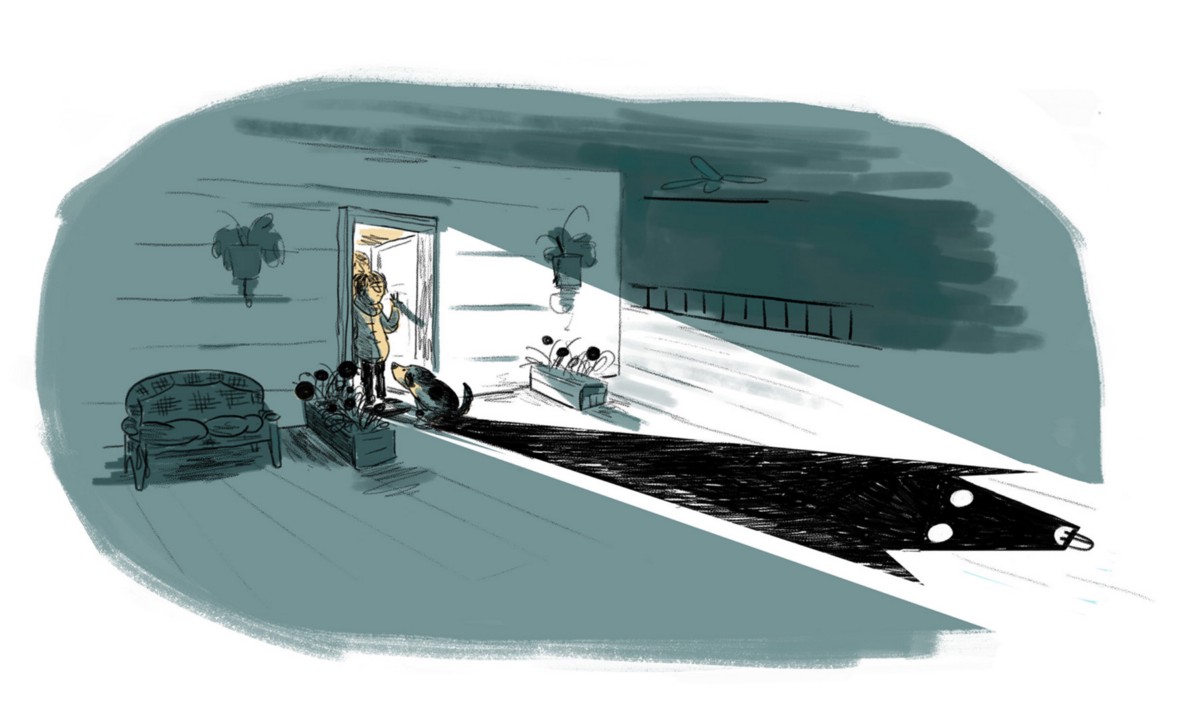Interviews
The Unhinged Fiction of Greg Ames
The narrator of one story in ‘Funeral Platter’ cuts off his arm to get back at an ex—and it only gets weirder from there

I met Greg Ames at the 2014 Colgate Writers’ Conference, where we talked about Aimee Bender and Fugazi. Three years (and three conferences) later, the stories I’ve heard Ames read at Colgate—in various maniacal personas—have come together in his new collection, Funeral Platter. The stories in Funeral Platter are dark, funny, and deranged: a man severs his arm to get back at his ex; Pontius Pilate talks trash in a ping-pong tournament; a dance party erupts in a Taco Bell men’s room; a couple hosts their own funeral.
Ames’ first novel, Buffalo Lockjaw, won a NAIBA Book of the Year Award, and was featured in a Dockers ad. We conducted this conversation over email, with only one or two cat pictures punctuating the discussion.

Deirdre Coyle: Both J. Robert Lennon and Brock Clarke described this collection as “unhinged.” Are you?
Greg Ames: Only between the ears. My outer life is pretty stable these days, so somehow I’ve managed to filter all that berserk energy into my writing, where it is less likely to get me arrested.
DC: I’d describe a lot of these stories as elastic realism (a phrase I copped from Nancy Pearl). I’m interested in the proliferation of terms about fiction that walks a line between realism and speculative fiction (magical realism, slipstream, new weird, surrealism, etc.). Do you relate to one term over another—or to any of them?
GA: I just looked up elastic realism. Seems like she’s talking about fiction that is firmly grounded in realism just before it goes off-kilter. Some of my favorite stories operate like that. I’m thinking of one by Stuart Dybek called “The Death of the Right Fielder,” which seems at first like a typical baseball story but then you realize it’s really about aging, death, loneliness, the expendability of human lives, etc. He grounds you in the story, boys playing baseball, and then the secret story emerges. The story behind the story pops up and haunts you. When I begin a new piece, I feel like I’m just writing about the ordinary world—the parking lot, the grocery store, etc.—and then something happens. It swerves.
DC: Yes, that elasticity almost always feels like realism while I’m immersed in it, reading or writing. Like in your story “Punishment,” where a man starts cutting off his limbs to “punish” his ex. I’ve definitely known that guy.
GA: I think I’ve been that guy. I wrote “Punishment” before I knew it, when I was nineteen and still had no idea how scared I was of everything. But I wrote this little two-pager, liked it, hoped it was good, and brought it to the office of the literary journal on my college campus. Personally hand-delivered it to some longhaired dude on a garbage-picked couch. On his upper arm was a tattoo that said SHAMELESS. I turned and walked away without saying a word. He contacted me a few days later saying he loved “Punishment” and wanted to publish it. I said no, it wasn’t ready, and retracted it. That’s just one of the ways my behavior confused people. It’s amazing still that anything of mine actually gets published because there are so many strategies for not completing the process: it’s not done yet, I could make it better, I want to change the ending, etc.
DC: I spent a lot of time in my teens and early twenties working service industry jobs, then library jobs, and not really showing anyone my writing. Fortunately I saved everything, and have some gnarly journals from those years. Do you have anything like that that you mine for material?
GA: Yeah, I definitely borrow from my life, and everything has some autobiographical connection, and I’ve worked plenty of jobs and lived in a lot of places, but the task is to fuel the writing with the most charged parts of the truth. In Funeral Platter, I’ve included some parts of my life—I’ll leave it to the reader to guess which parts are based on my actual life, but I can say with confidence that, unlike the narrator of “Punishment,” I have yet to chop off my arm after a breakup.
I can say with confidence that, unlike the narrator of “Punishment,” I have yet to chop off my arm after a breakup.
DC: Your first novel, Buffalo Lockjaw, was firmly centered in your hometown of Buffalo. Not all of the stories in Funeral Platter are explicitly located, but those that are take place across New York state: Buffalo, Akron, Utica, Brooklyn, the Catskills. How does New York—in its entirety—affect your writing?
GA: Well, I grew up in Buffalo, so I experienced being a child there, and some of being an adult. When I moved to Brooklyn, I had a whole new set of experiences, made a whole new life, and that informed some of the energies of my writing, as well. I lived in England and France for a few years too, worked as a bartender, and that helped me to drink. To be honest, I’m more interested in the generic spaces found in all cities, such as convention centers, barbershops, funeral homes, public restrooms, movie theaters, and parking lots. Most of my stories, I realize now, are set in interstitial spaces or the non-places that people have to go on their way to somewhere else.
DC: Which process do you find more agonizing—novel or short story writing?
GA: I love the compression, power, and tonal and structural difficulty of the short story. In The Lonely Voice, Frank O’Connor says the short story is closer to the poem than the novel. A novel takes much more planning, sweating, weaving, but I think it’s inaccurate to say that the short story is a less complex form than the novel. Anyway, I’m shocked that the short story is not a more popular form among general readers. It seems like the perfect form for this age. You can read a short story on a train ride and feel like you’ve been given all the psychological depth and emotional resonance of a novel. I guess general readers are resistant because they sometimes don’t know what to feel after finishing a short story. They couldn’t get comfortable in it. “A novel wants to befriend you,” Joy Williams once wrote. “A short story almost never.”
Support Electric Lit: Become a Member!
DC: How long was this collection in the making?
GA: When I wrote “Discipline,” I was maybe twenty-three and had just begun sending out my short stories. One of my toughest critics was my uncle Neil who taught at the University of Buffalo. My aunt Margaret told me that after he read that story, he came down the stairs holding it over his head and said loudly, “He’s done it!” That felt like one of my first acknowledged successes. So, it’s beautiful to have a lot of early work in Funeral Platter. It represents so many different parts of my life, my history, and obviously, parts of my imagination.
DC: You’ve said that you hated school growing up. Now you’re an English professor. Has that youthful hatred affected the way you teach?
GA: Well, I hated school because I knew that I wasn’t being seen. I was the kid who fell through the cracks a little bit; I don’t think they knew what to do with me. And it was that way until Buffalo State College when I stumbled into the classroom of an English professor who would change my life. Marvin LaHood opened my experience of literature and my understanding of my own capabilities. Once I was actually seen by someone, I was able to feel safe in the academic setting and pretty soon after that things took off for me, cerebrally and creatively. Big Marv was a powerhouse. I mean, he’s 81 years old and he’s still teaching! I just spoke to him today actually. He’s still so committed to it; he lives by this stuff—the sentences, the stories. And that’s informed the way that I teach. The classroom is a place where I feel at home—totally comfortable being myself, and it seems like students respond to that.
DC: The dreaded question: what are you working on next?
GA: I don’t know about dread. There’s always doubt but mostly I’m just playing with words. At the moment, I’m putting together a second short story collection. I have two novel drafts that I keep coming back to—I’ve been writing and rewriting these things for years. I call one of them a comic existential detective novel, whatever that means. And lastly, I’m in the process of approaching a larger nonfiction project about my childhood, though I haven’t quite figured out how to move into nonfiction with the same ease that I have around fiction.









